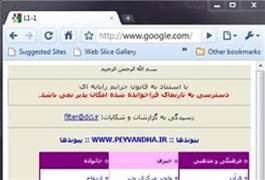Iran has begun trying to filter out Google for internet users in the country after protests over a controversial anti-Islam film published on YouTube.

An Iranian official working for the state-run office for online censorship and computer crimes, Abdulsameed Khorrambadi, told the state news agency Irna over the weekend that "Google and Gmail will be filtered throughout the country until further notice".
Iranian president Mahmoud Ahmadinejad has condemned the film, the Innocence of Muslims, as "quite ugly" and having "very little or nothing to do with freedom and freedom of speech", ahead of his visit to the UN General Assembly this week.
He also spoke out against the violence and loss of life caused by the protests against the movie, saying "we condemn any type of extremism".
News of the move to block Google came from the government-linked organisation The Young Journalists' Club (Persian), which said the main search page has been replaced with a notification of the block.
Iran has previously blocked Google services including contacts, Translate and Gmailaccording to the organisation.
Though expected to be a country-wide filter of Google, The Guardian reported that some of the search giant's web propertes remained accessible in the capital Tehran.
Secure internet
The Google filter is part of a wider plan within the Iranian Government to build its own version of the internet, providing access only to explicitly condoned sites and material. Government agencies would be connected to the secure domestic service ahead of plans to link ordinary Iranians up to the same network in a move to beef up cyber security. The Islamic state tightened its cyber security after its disputed nuclear program was attacked in 2010 by the Stuxnet computer worm, which caused centrifuges to fail at the main Iranian uranium enrichment facility. Tehran, whose nuclear program is suspected by the West of being aimed at developing a bomb, accused the United States and Israel of deploying the worm. "In recent days, all governmental agencies and offices ... have been connected to the national information network," deputy communications and technology minister Ali Hakim-Javadi was quoted as saying on Sunday by the Mehr news agency. The second phase of the plan would be to connect ordinary Iranians to the national network. According to Iranian media, the domestic system would be fully implemented by March 2013, but it was not clear whether access to the global Internet would be cut once the secure Iranian system was rolled out. Millions of websites deemed to have un-Islamic content are blocked by Iranian authorities, along with many expressing anti-government views. Many Iranians suffered serious problems accessing email and Internet social networking sites in February, ahead of parliamentary elections. Opposition supporters used social networking sites to organise widespread protests after the disputed 2009 re-election of President Mahmoud Ahmadinejad, which they said was rigged in his favour. Communications and technology minister Reza Taqipour said last month Iran needed to develop its own network to ensure the safety of the country's information, the Fars news agency reported. "Especially on major issues and during crises, one cannot trust this network at all," he said, referring to the global Internet. "Control over the Internet should not be in the hands of one or two countries." Authorities said in April a computer virus was detected inside the control systems of Kharg Island — which handles the vast majority of Iran's crude oil exports — but the terminal remained operational. With Reuters.


_(28).jpg&h=140&w=231&c=1&s=0)
_(20).jpg&h=140&w=231&c=1&s=0)

_(36).jpg&h=140&w=231&c=1&s=0)





 iTnews Executive Retreat - Security Leaders Edition
iTnews Executive Retreat - Security Leaders Edition
 iTnews Cloud Covered Breakfast Summit
iTnews Cloud Covered Breakfast Summit
 Melbourne Cloud & Datacenter Convention 2026
Melbourne Cloud & Datacenter Convention 2026
 The 2026 iAwards
The 2026 iAwards












_(1).jpg&h=140&w=231&c=1&s=0)



